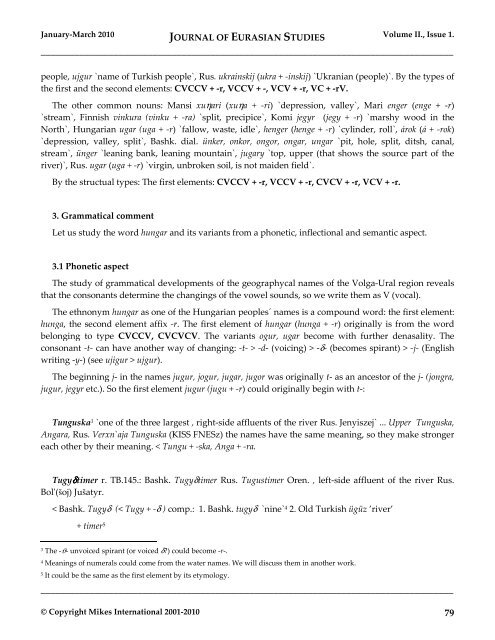EurasianStudies_0110..
EurasianStudies_0110..
EurasianStudies_0110..
You also want an ePaper? Increase the reach of your titles
YUMPU automatically turns print PDFs into web optimized ePapers that Google loves.
January-March 2010 JOURNAL OF EURASIAN STUDIES Volume II., Issue 1.<br />
_____________________________________________________________________________________<br />
people, ujgur `name of Turkish people`, Rus. ukrainskij (ukra + -inskij) `Ukranian (people)`. By the types of<br />
the first and the second elements: CVCCV + -r, VCCV + -, VCV + -r, VC + -rV.<br />
The other common nouns: Mansi xuηari (xuηa + -ri) `depression, valley`, Mari enger (enge + -r)<br />
`stream`, Finnish vinkura (vinku + -ra) `split, precipice`, Komi jegyr (jegy + -r) `marshy wood in the<br />
North`, Hungarian ugar (uga + -r) `fallow, waste, idle`, henger (henge + -r) `cylinder, roll`, árok (á + -rok)<br />
`depression, valley, split`, Bashk. dial. ünker, onkor, ongor, ongar, ungar `pit, hole, split, ditsh, canal,<br />
stream`, ünger `leaning bank, leaning mountain`, jugary `top, upper (that shows the source part of the<br />
river)`, Rus. ugar (uga + -r) `virgin, unbroken soil, is not maiden field`.<br />
By the structual types: The first elements: CVCCV + -r, VCCV + -r, CVCV + -r, VCV + -r.<br />
3. Grammatical comment<br />
Let us study the word hungar and its variants from a phonetic, inflectional and semantic aspect.<br />
3.1 Phonetic aspect<br />
The study of grammatical developments of the geographycal names of the Volga-Ural region reveals<br />
that the consonants determine the changings of the vowel sounds, so we write them as V (vocal).<br />
The ethnonym hungar as one of the Hungarian peoples´ names is a compound word: the first element:<br />
hunga, the second element affix -r. The first element of hungar (hunga + -r) originally is from the word<br />
belonging to type CVCCV, CVCVCV. The variants ogur, ugar become with further denasality. The<br />
consonant -t- can have another way of changing: -t- > -d- (voicing) > -δ- (becomes spirant) > -j- (English<br />
writing -y-) (see ujigur > ujgur).<br />
The beginning j- in the names jugur, jogur, jugar, jugor was originally t- as an ancestor of the j- (jongra,<br />
jugur, jegyr etc.). So the first element jugur (jugu + -r) could originally begin with t-:<br />
Tunguska 3 `one of the three largest , right-side affluents of the river Rus. Jenyiszej` ... Upper Tunguska,<br />
Angara, Rus. Verxn`aja Tunguska (KISS FNESz) the names have the same meaning, so they make stronger<br />
each other by their meaning. < Tungu + -ska, Anga + -ra.<br />
Tugyδδδδtimer r. TB.145.: Bashk. Tugyδtimer Rus. Tugustimer Oren. , left-side affluent of the river Rus.<br />
Bol'(šoj) Jušatyr.<br />
< Bashk. Tugyδ (< Tugy + -δ ) comp.: 1. Bashk. tugyδ `nine` 4 2. Old Turkish ügüz ’river’<br />
+ timer 5<br />
3 The -ϑ- unvoiced spirant (or voiced δ?) could become -r-.<br />
4 Meanings of numerals could come from the water names. We will discuss them in another work.<br />
5 It could be the same as the first element by its etymology.<br />
_____________________________________________________________________________________<br />
© Copyright Mikes International 2001-2010 79

















